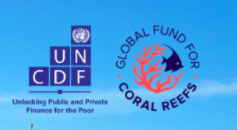Remarks of UNCDF Executive Secretary Preeti Sinha at the "Accelerating Action for Food Security and Resilience" Side Event-2022 Spring Meetings of the World Bank Group and the International Monetary Fund
As Prepared for Delivery
Dear Colleagues, it is a privilege to represent the UN’s flagship catalytic finance entity for the world’s 46 least developed countries, alongside so many esteemed leaders of the public and private sector.
The urgent coral reef crisis is compounding and accelerating issues of food security globally. With coral reefs supporting one billion people globally and a quarter of all marine life; the potential loss of coral reefs would have devastating impacts across vulnerable coastal communities around the world - collapsing livelihoods, decreasing coastal protection, and eroding food-security.
Coral reefs support 6 million fishers in nearly 100 countries. They are a primary source of food and protein for many coastal communities. In fact, 4.3 billion people around the world rely on fish for 15% of their animal protein intake. If properly managed, coral reefs can yield an average of 15 tons of fish and other seafood per square kilometer per year. When coral reefs die, however, it becomes a food security crisis for the local communities who depend on them. Yet coral reefs are disappearing faster than any other ecosystem on the planet. 50 per cent of the world's coral reefs have already been destroyed and more than 60 per cent of the remaining reefs are under threat.
However, it is NOT too late to act. That said, reefs require more than just public resources. Private resources must be accelerated and invested in reef-positive sustainable blue economy to bridge the ‘coral reef funding gap’. Now, more than ever, private investment in the resilience of coral reefs is both necessary and possible.
Today, the Global Fund for Coral Reefs presents the greatest opportunity for scaling global private investment in these ecosystems crucial to food security globally. Through a blended finance approach, the Global Fund for Coral Reefs is delivering blended solutions of public and private finance to support pipeline development of reef-positive businesses and innovative financial tools, to address the coral reef funding gap.
The Global Fund defines a reef-positive business as an organization or enterprising entity engaged in commercial, industrial, or professional activities which have a direct or indirect positive impact on coral reefs. Reef-positive business models could include a direct conservation activity or payment for ecosystem services, however, more frequently in the GFCR pipeline we see business models that, through their normal operations, address local drivers of coral reef degradation. This includes examples such as sustainable agriculture and fisheries, mariculture, sustainable agriculture, plastic recycling facilities, and coral reef restoration.
Further, the GFCR is supporting the development and implementation of blue carbon and resilience credits, reef insurance, user fees and other instruments to supplement financing to build the resilience of these unique and threatened ecosystems. The GFCR is also enabling local incubators and a technical assistance facility to strengthen local capacity for the long term, and catalysing a shift towards sustainable finance for coral reef conservation. The blended finance model to unlock impact investment used by the Global Fund for Coral Reefs will demonstrate a new approach to conservation and food resilience, applicable to all high-value ecosystems facing the local and climate-related threats.
Support for the development and scaling of these global pipelines of investable and scalable reef-positive interventions is only possible through the convening of a diverse coalition of partners committed to saving coral reefs. Backed by the United Nations and the International Coral Reef Initiative; the Fund is uniquely placed to convene investors, private sector companies, national and local governments, civil society and NGOs, and local communities to accelerate sustainable solutions for the world’s coral reefs and coastal communities.
We would like to thank the catalytic Grant Fund donors leading the way to unlock and de-risk reef-positive finance; the Paul G. Allen Family Foundation, the Prince Albert II of Monaco Foundation, Germany, UK, France, and Canada.
Further, we thank the Green Climate Fund for the commitment of $125 million to the catalytic tranche of the Global Fund for Coral Reefs Equity Fund as a first-loss investment. As the Green Climate Fund’s first at-scale private sector programme in the blue economy, the commitment is de-risking investment for senior tranche private investors at the fund level.
The United Nations Capital Development Fund, along with UNEP and UNDP, is immensely proud to be a founding member of the Global Fund for Coral Reefs. UNCDF’s role includes our work to capitalize the Fund, our membership and duties on the Executive Board, as well as our support to offer catalytic “bridge services” within the Fund’s investment continuum.
In closing, I call on private investors and financial institution to lead with innovation and impact; INVEST IN CORAL REEFS. ‘Reef-positive investment’ is a win-win for investors, for communities and biodiversity. Thank you.
